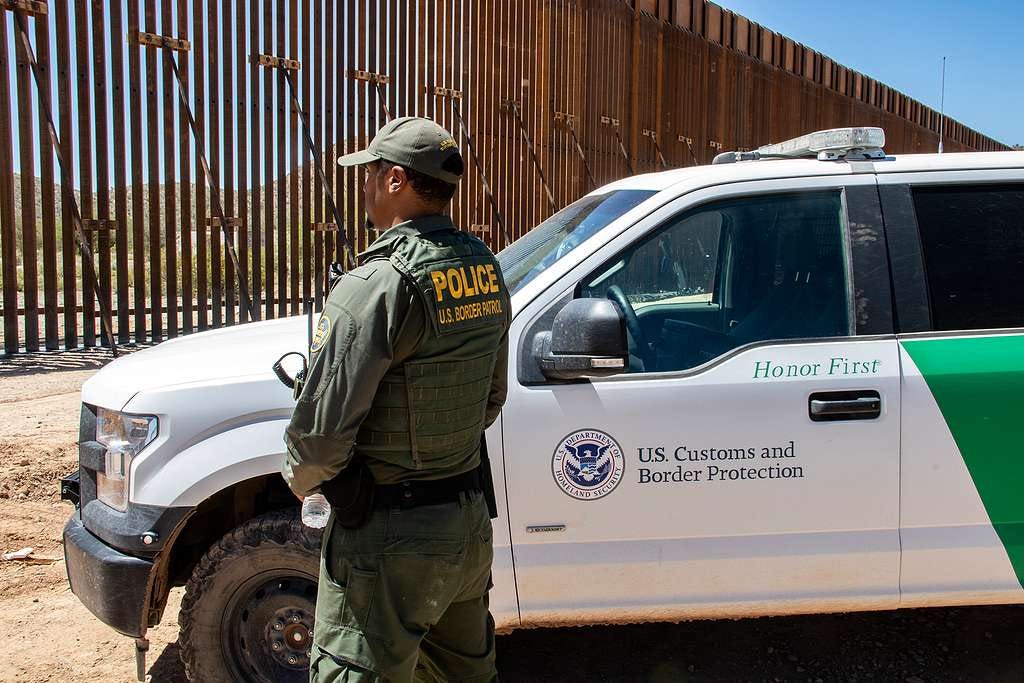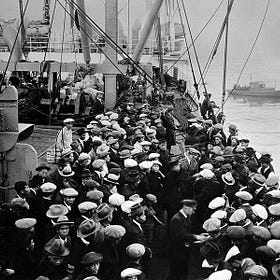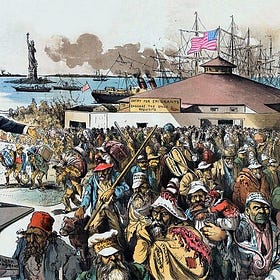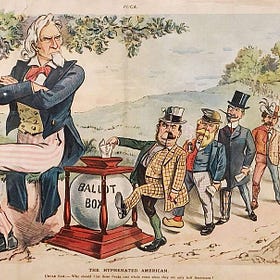Afraid of the Other: Revisiting Old Fears, New Foes
A short overview of our previous series on immigration in America during the early 20th-century
Back in August 2023, we published a series of articles about the history of Italian immigration to America during the early 20th-century. At this time, politicians and influential thinkers made use of scientific and medical arguments to justify their pre-existing anxieties about immigrants. We thought these posts were worth revisiting given that these anxieties have resurfaced in contemporary debates. Perhaps the biggest difference with our time was not in the concerns regarding immigrants, but in the arguments used to support them.
Migration has become one of the biggest concerns in political, economic and social discussions across the Western World. The debate becomes entrenched in policies and differing world views, with anti-immigration parties and politicians gaining support and proposing extreme measures to appeal to the fears of a concerned population. Those who supported Brexit often demonized immigrants and used this issue to galvanize voters to leave the European Union. More recently, concerns about immigrants played a significant role in President Trump’s election.
Immigrants in the United States

One of President Donald Trump’s main campaign promises was dealing swiftly - and radically - with immigrants; which many of his voters perceived as an existential threat to America.
In his first two weeks in office, he signed a series of executive orders under the pretense of “protecting American families” from illegal immigration. He has increased police and military powers to deal with immigrants, continued with mass deportations, and complicated the process for asylum seekers. His administration has allegedly revoked work permits for TPS, PIP, and other visa applicants, and the overall strengthening of border control and legislation. He has promised to end birthright citizenship because of how this policy is supposedly exploited. A Judge recently declared this measure unconstitutional.
Trump also expressed anxiety about immigration during his first campaign. He stated that the United States had become a “dumping ground” (Vile, p. 249). He is not the first President to be anxious about immigrants, even if his words are more crass. In the past, President Coolidge argued that America had become an “asylum” (Vile, p.139). Both the 1921 and 1924 Immigration Acts, for example, sought to ban certain kinds of people who were deemed likely to become charges for the state, or who were deemed undesirable such as feebleminded, paupers, etc (Vile, p.151–158).
Coolidge argued that letting certain kinds of immigrants, who he described as “cheap manhood” would be “suicidal” (Vile, p.140). Similarly, Trump argued that many illegal immigrants are “people that have lots of problems”, including “rapists,” people who bring “drugs” and “crime” (Vile, p.249). In some sense, Trump’s reaction to the influx of Latin Americans is similar to those who enacted the Chinese Exclusion Act of 1892.
Throughout American history, there have been periods where citizens and American leaders have stressed about the effect of immigration. First, there has been a perception that immigrants take paying jobs from Americans (even if Americans are largely uninterested in those). Secondly, many immigrants send their earnings home, which is similar to what Chinese immigrants did before the Exclusion Act.
We have decided to revisit one of our favorite article series: Old Fear, New Foes. Where we explore how the fear of new immigrants is not a phenomenon exclusive to our times, and which arguments have been used in the past, to justify legislation and restrictions on immigration. We think this historical examination can help us think more clearly about immigrants today.
Further, when we originally shared these we were just starting.
1. Scientists provided biological arguments to justify rejecting certain immigrants
During the 1920s, Americans became increasingly concerned about the biological quality of prospective immigrants resulting in the most restrictive Immigration Act ever enacted. The scientific community provided the necessary authority to suggest “scientific” solutions to political and social problems, even if these matters were beyond their scope.
Old Fears New Foes (1/5): New Reasons to Worry About Immigration
Scientists provided biological arguments to justify rejecting certain immigrants
2. The Threat of New Immigrants
In a similar way to current anti-immigration rationales, Americans were concerned with the impossibility of immigrants assimilating to their society. Immigrants were perceived as too different due to their social, economic, religious and cultural characteristics. Chinese and Italian immigrants were considered dangerous to the country’s social structure, as they appeared to be unwilling to assimilate, lived in undesirable conditions and had too many children. Furthermore, they were perceived as racially, socially and culturally inferior to migrants hailing from white, protestant countries.
Old Fears New Foes (2/5): Immigrants Do Not Assimilate
Why were Italians seen as a “very degraded and ignorant population?”
3. The Economic Threat
This might be, perhaps, the most familiar argument for those who watch the news. Though there is little evidence supporting these claims, a significant subset of the American (and other nations) population believe that immigrants are stealing or worsening job opportunities for nationals.
In the 1920s, the situation was no different. There was a widespread belief that, due to the influx of new immigrants willing to accept jobs for lower wages, they would outcompete native-born workers. Chinese workers would force white Americans out of their jobs, or to their “degraded” standards of living.
4. The Onslaught of Criminals
Are all immigrants criminals? Depending on who you ask, the answer might surprise you. Even though, by applying a bit of critical thinking, you may find that the answer is most definitely not, immigration and criminality have been linked for decades, if not centuries.
And Italian immigrants were no different. The general American public tended to make a connection between Italian immigrants and crime, as well as undesirable behavior. This was due to the fact that, while making up only an eight of the American population by the late 19th-century, a third of the crimes were committed by a foreign population.
Old Fears New Foes (4/5): The Onslaught of Criminals
Why Americans feared Italian Immigrants during the 1920s
5. Race, Italians and Restrictions
Eugenicists played a major role in politics during the first half of the 20th-century. And Italians would also be discriminated against based on race. They were seen as a middle ground between black people and white, because, while they were of clearer skin than black people, they took the same jobs and had “similar characteristics”. Therefore, eugenicists were concerned with Italians mixing with the white race, and demeaning their status or quality.
While today eugenicists are no longer big players in policy making, some of the same reasoning has been used, albeit on different terms.
Old Fears New Foes (5/5): Racism & Restricting Immigration
Race, Italians, and Immigration Restriction.
Let us know what you think!










For all the reasons you've mentioned—and many others—we're witnessing a troubling resurgence of the "othering" of immigrants in numerous countries today. It's alarming how predictable the arguments have become, almost as if their proponents simply dusted off old ideologies and revived them with renewed fervor against immigrants.
I remember, back in the U.S. during the 2000s and 2010s, while there were certainly sporadic hate crimes and incidents targeting Muslims/South Asians in the wake of the War on Terror, there was still a clear societal effort to prevent the slide into such harmful "othering" rhetoric.
Fast forward to 2012-present, and it has become increasingly acceptable for people to vocalize their so-called "truths" about immigrants. Over time, these voices have grown louder, coalescing into a political force that is now on the verge of influencing policy.
As the saying goes, "Those who fail to learn from history are doomed to repeat it." Sadly, we may be heading in that very direction.
I have reported from the front lines of crime for much of my life. I agree that immigrants/migrants carry a heavy load as they try to fit into an existing society. But I also have come to believe that real social dynamics are at work in the process of diversity/assimilation. Do new immigrant workers suppress wages of indigenous laborers? Plenty of evidence says yes and common sense would seem to support that idea. Are there real friction points between existing cultures and new arrivals. Of course there are. And here's an idea that makes sense to me: The "othering" by the majority population causes an encapsulation of the community of unassimilated people who can be easily exploited by existing criminal elements from "the old country." That's how the Black Hand Societies from Sicily and other Italian regions got a foothold in the US. The foothold became a wedge for a time, from the late 19th to the middle 20th centuries, and La Cosa Nostra became a very significant and dangerous force in the entire country. Also called the Mafia, LCN was a coherent organization that finally forced J. Edgar Hoover and his FBI to rescind a policy of staying out of urban vice and corruption cases. The same is true to some extent with today's Mexican criminal trafficking cartels. They have made millions by using old smuggling routes and methods to bring illegal immigrants across the border. That's exploitation at its most degrading. Often leaders of the involved immigrant community will feel forced to ignore those real problems out of defensiveness. In the case of the Italian community, assimilation and acceptance came about at the same time the US government was dismantling the Mafia infrastructure that Mob turncoat Joe Valachi called "the second government of the United States." The highpoint of LCN influence seems to have been the early 1970s, when multiple mobsters began to turn informant at the same time "The Godfather" became part of the popular culture mythology of the country. Immigrant cartel crime hasn't coalesced in the way the Italian crime families did, not yet at least. But pretending that there are not criminal elements inside immigrant communities will not do much to eradicate the negative images of immigrants the hard-right loves to float. MAGA is a combination of nationalism and techno-optimism, somebody recently remarked. Softening that ideologies sharp edges needs to be done and maybe the way to do it is to accept the realties that are ignored or denounced by the leaders who welcome the millions, literally, of new potential citizens.